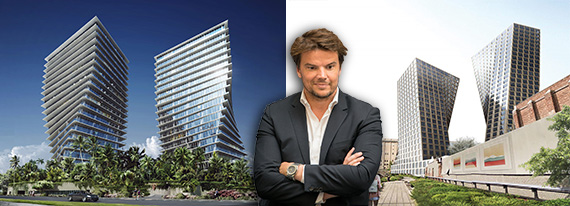They both appear to dance, but two projects in South Florida and New York City are, according to the architect, very different.
The one — Grove at Grand Bay in the Miami neighborhood of Coconut Grove — consists of two newly completed condominium towers that twist away from each other. Similarly, HFZ Capital Group plans to build two condo towers in Chelsea that almost seem to be caught mid-tango. Bjarke Ingels, the designer behind both projects, said on Thursday that the similarities end there: While each features two buildings that respond to each other, their movements and appearances are quite different.
The $1.9 billion Chelsea project at 76 11th Avenue, dubbed “The Eleventh,” will feature a pair of towers of different heights, one rising 35 stories and the other 25, with 90,000-square-feet of retail, 240 condos and a Six Senses hotel, according to plans filed by HFZ. The facade is structural, in a similar fashion to neighboring buildings, in that the windows are clearly separated by stone and metal. The Miami project, by comparison, is more glassy, and the sloping concrete columns that create the twisting-motion are more visible from inside of the building. The 20-story buildings also feature diminished footprints on the lower levels — meaning they appear skinnier on the bottom than at the top — which allows for better views of the bay for more residents (and for the buildings’ neighbors).
“They are sculpted differently,” the Danish architect said.
Ingels and developer Terra hosted a talk on Thursday at Bjarke Ingels Group’s Downtown office to discuss the South Florida condominium. The project was his first in the state and his first-ever luxury condominium in the United States. The 98 units ranged from $2.95 million to $25 million, working out to an average of $1,100 per square foot. The last remaining unit — the penthouse — is currently on the market for $28 million.
Ingels said the design is a combination of “rational Scandinavian” meets Miami. He said the latter favors a “Caribbean interpretation of modernism,” which he described as rounded, feminine architecture that puts premium on balconies with impressive ocean views.
The project also features a lush landscape — designed, no kidding, by a landscape architect named Raymond Jungles — and a canopy that winds “like an umbilical cord” between the two buildings, Ingels said. He also showed off several other models that his firm had tested for the site before settling on the final design.
“We had to kiss 50 or 60 frogs before we found something that worked,” he said.
Ingels recently completed his first New York project, the Durst Organization’s Via57. He is currently working on Tishman Speyer’s Hudson Yards project, the Spiral, and is expected to design 2 World Trade Center, if and when the project gets off the ground.
